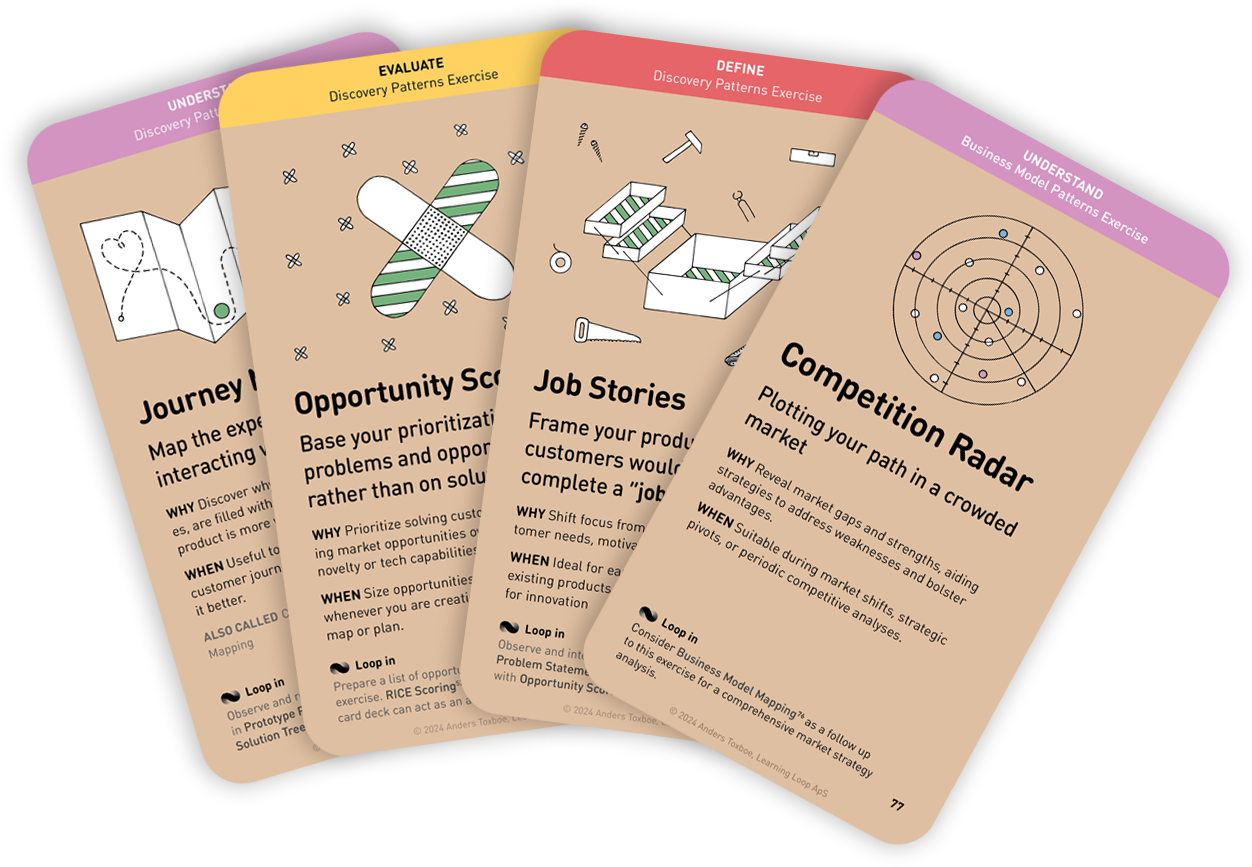Workshop Exercises: Ideate
Ideas first, Patterns later
Let creativity lead by prioritizing own ideas over psychological insights

Why: Postponing ideation with persuasive patterns fosters a wider, unbiased spectrum of ideas, unguided by card limitations
When: Use when you are seeking fresh, unanchored perspectives on a design problem
By introducing the persuasive patterns later in the process, this approach minimizes the immediate influence and bias preselecting persuasive patterns might have on the participants’ thought processes, leading to a more diverse range of initial ideas.
This exercise is tailored to maximize the creative potential of participants by initially emphasizing their own ideas and then strategically using persuasive patterns cards to refine and enhance these concepts.
When the cards are introduced after the initial ideation phase, participants engage with them more critically, considering how these concepts can enhance or modify their existing ideas rather than dictating the direction of their thinking from the outset. By revisiting and refining initial ideas with persuasive patterns, participants practice the essential skill of adapting and evolving ideas based on new information and insights. While the exercise starts with freeform ideation, the subsequent introduction of the cards underscores the value these tools can bring in refining and strengthening design concepts.
Instructions for running this play
Before the exercise. Prepare a clearly defined design challenge or problem statement for the group to work on. Ensure it’s specific enough to guide their thinking, yet open-ended to allow for creativity.
Some example prompts:
- How might we increase user engagement in our onboarding process?
- What strategies can encourage users to return to an app daily?
- How can we drive more referrals from existing customers?
Make sure you have enough Persuasive Patterns card decks and materials (sticky notes, markers, and a whiteboard or digital tool).
-
Introduce the exercise Begin by explaining the power of timing in ideation. Clarify that this exercise is designed to explore how and when Persuasive Patterns should be introduced during brainstorming. The key insight? Ideas become stronger when patterns are used as a refinement tool rather than a starting point.
-
Divide into groups Split participants into small groups of 3–4 people to encourage collaboration while keeping discussions focused.
-
Present the design challenge Clearly introduce the problem statement that participants will work on. Encourage them to stay user-focused and think beyond typical solutions.
- Free brainstorming – No cards yet
- Timebox: 15 minutes
- Ask teams to generate as many ideas as possible without using any structured tools.
- Encourage participants to write each idea on a sticky note and group similar ideas into themes.
- Push them to go beyond first-round thinking, as research suggests the most original ideas emerge in later rounds.
-
Distribute Persuasive Patterns cards randomly Hand out a random selection of 5 Persuasive Patterns cards to each group. These should not be chosen based on their relevance to the ideas—forcing a fit is part of the challenge.
- Allow teams 5 minutes to react to the cards and discuss their first impressions.
- Ask: Do any cards immediately seem useful? Do some feel like a forced fit?
- Refine ideas using Persuasive Patterns
- Timebox: 15–20 minutes
- Each group must modify or enhance their best ideas using at least 3 of their assigned cards.
- Encourage unconventional connections—even forced fits can spark innovation!
- Teams should write a short explanation of how they applied the patterns to refine their ideas.
- Present ideas
Have each group Playback their strongest idea to the room. Each team should explain:
- How they originally approached the challenge
- How the Persuasive Patterns changed or strengthened their idea
Timebox 3–5 minutes per group, followed by 5 minutes of discussion and feedback from the rest of the participants.
-
Discuss adaptability Facilitate a full-group discussion about how the generated ideas—despite being unconventional—could be adapted into real-world solutions.
- Ask: How can these ideas be implemented in actual product design?
- Highlight the key insight: Using structured tools too early can limit creativity, but applying them later refines and strengthens ideas.
Encourage participants to reflect on how they can use this “Ideas First, Patterns Later” method in their own projects.
Key Takeaways
- Timing matters. Introducing structured tools too early can constrain creativity, but using them later enhances and sharpens ideas.
- First ideas are often predictable. Push past the first round of brainstorming to unlock deeper creativity.
- Persuasive Patterns should be used as an enhancement tool. They help refine raw ideas into more strategic, behaviorally informed solutions.
Instructions for running this play
Before the exercise. Prepare a clearly defined design challenge or problem statement for the group to work on. Ensure it’s specific enough to guide their thinking, yet open-ended to allow for creativity.
- Introduce the exercise
Begin by introducing the challenge of “forcing a fit”. Clarify that the purpose is to encourage innovative thinking by using cards that might not seem directly relevant to the problem. - Divide into groups
Split the participants into small groups (3-4 members per group works well) to foster collaboration and diverse idea generation. - Present the design challenge
Clearly present the design challenge or problem statement to the groups. - Distribute Persuasive Patterns cards randomly
Hand out a random selection of 5 persuasive pattern cards to each group. These should be cards that, at first glance, do not seem to fit directly with the design challenge. Allow a few minutes for the groups to react and discuss their initial thoughts on the cards they received. - Ideation
Allot a Timebox of 10-20 minutes to brainstorm ideas for the design challenge using only the cards they were given. Emphasize that they should strive to incorporate at least 3 of the cards handed out into their solution, no matter how unconventional. Let them write the title of each solution on sticky notes - one idea per note. Encourage participants to discuss and debate how the principles on the cards can be adapted or interpreted to fit the design challenge. - Present ideas
Have each group Playback their ideas to the rest of the participants. Encourage them to explain how they used the cards to shape their solutions. After each presentation, Timebox 5 minutes of feedback and discussion for each group. This can include questions from other groups and insights from the facilitator. - Discuss adaptability
Facilitate a full-group discussion about how the generated ideas, despite being unconventional, could be adapted or normalized to fit more practical contexts.
Consider discussing how this exercise can be applied to their future work, emphasizing the importance of creative flexibility and adaptability in design.
A collection of workshop exercises that will help you ditch dull meetings and facilitate with confidence. It will help you master the design process and have more productive time with your team. The card deck will be ready for purchase in the end of 2026 and is now undergoing rigorous testing.
Reserve your deck!